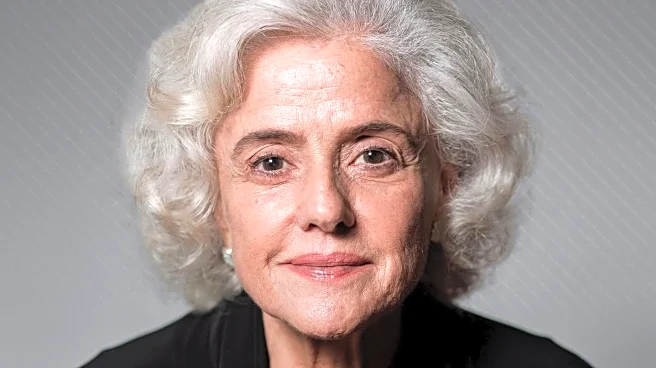What's Happening?
Dita Kraus, a Holocaust survivor known for her role as the secret librarian of the children's block in Auschwitz, has died at the age of 96. Kraus was a central figure in the book 'The Librarian of Auschwitz,' which detailed her experiences in the Nazi
death camp. Born in Prague in 1929, Kraus was deported to the Theresienstadt ghetto in 1942 and later transferred to Auschwitz. There, she was tasked with safeguarding a small collection of books, a responsibility that helped her survive the harsh conditions. After the war, Kraus returned to Prague, married Otto Kraus, and immigrated to Israel in 1949, where she worked as a teacher. Her grandson, Udi, expressed his sorrow on Facebook, highlighting her impact as a painter, writer, and spiritual guide.
Why It's Important?
Dita Kraus's story is a poignant reminder of the resilience and courage displayed by Holocaust survivors. Her role as the librarian in Auschwitz symbolizes the power of education and knowledge even in the darkest times. Kraus's life and legacy continue to inspire generations, emphasizing the importance of remembering and learning from history to prevent future atrocities. Her contributions as a teacher in Israel further highlight her commitment to education and the nurturing of young minds, ensuring that the lessons of the past are not forgotten.
What's Next?
While Dita Kraus's passing marks the end of a significant chapter, her story will continue to be shared through literature and education. The book 'The Librarian of Auschwitz' serves as a testament to her bravery and the enduring spirit of those who survived the Holocaust. Educational institutions and Holocaust memorials may continue to honor her legacy, ensuring that her experiences and the lessons they impart remain relevant for future generations.
Beyond the Headlines
Dita Kraus's life story raises important ethical and cultural questions about the preservation of history and the role of education in fostering understanding and tolerance. Her experiences highlight the importance of safeguarding cultural and historical artifacts, even in dire circumstances, and the impact such efforts can have on personal survival and collective memory. Kraus's legacy challenges us to consider how we can use education as a tool for peace and reconciliation.
















